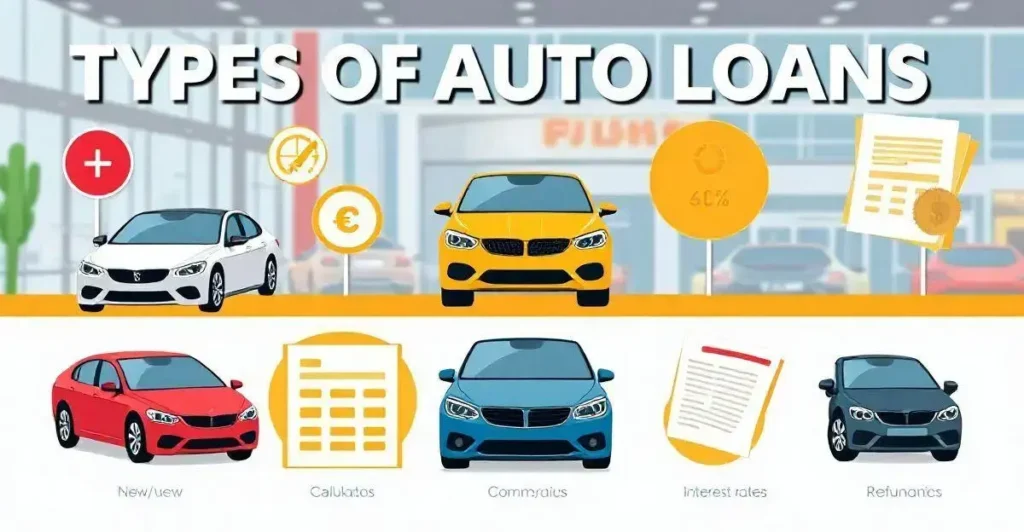Auto loans for first-time buyers are designed to help individuals finance their vehicle purchase, offering various options such as new and used car loans. To get the best deal, it’s crucial to check your credit score, compare lenders, and understand the loan agreement terms.
Are you a first-time buyer looking for the best options in auto loans for first-time buyers? If so, you are not alone. Many new car buyers face challenges in navigating the lending process. Fortunately, there are various loan options available that can help you get behind the wheel without breaking the bank.
In this guide, we will cover everything you need to know about auto loans, including tips for securing the best rates and terms for your needs. Get ready to take the next step toward car ownership!
Understanding Auto Loans
Understanding auto loans is crucial for auto loans for first-time buyers. Auto loans are loans that help individuals finance the purchase of a vehicle. They allow you to borrow money to buy a car, which you then pay back over time with interest.
When you take out an auto loan, you will typically agree to a monthly payment amount and a repayment period, often ranging from three to seven years.
How Auto Loans Work
When you apply for an auto loan, lenders will evaluate your credit history and financial profile to determine how much money they are willing to lend you. They will also establish the interest rate, which affects your monthly payments. The better your credit score, the lower your interest rate is likely to be. Lower payments mean you’ll pay less overall by the end of the loan.
Secured vs. Unsecured Loans
Most auto loans are secured loans, meaning the vehicle itself acts as collateral. If you fail to make payments, the lender can repossess the car. Unsecured loans, on the other hand, do not require any collateral, but they may come with higher interest rates. It is essential to understand these differences when considering applying for auto loans for first-time buyers.
Loan Amount and Down Payment
The amount you can borrow largely depends on the vehicle’s value, your income, and your credit score. Furthermore, many lenders expect at least a down payment. Making a larger down payment can reduce the total loan amount and lower your monthly payments.
Loan Terms and Interest Rates
Loan terms are typically expressed in months, such as 36, 48, or 60 months. Generally, a shorter loan term means higher monthly payments, but you will pay less interest over the life of the loan. It’s essential to compare different offers from lenders to find the most favorable interest rates and loan terms.
In summary, understanding the fundamentals of auto loans can greatly aid first-time buyers in making informed decisions when financing their new vehicles. This knowledge not only helps you navigate the borrowing process but ensures that you find the best loan that fits your financial situation.
Benefits of Auto Loans for First-Time Buyers

Auto loans offer several benefits for first-time buyers that make the car purchasing process easier. Understanding these advantages can help you make informed financial choices.
1. Affordable Monthly Payments
One of the main benefits of auto loans for first-time buyers is that they break down the total cost of the vehicle into manageable monthly payments. This makes it easier for first-time buyers to budget their finances and plan for the expense.
2. Builds Credit History
Taking out an auto loan can help you establish or improve your credit history. Making scheduled payments on time demonstrates your ability to manage debt responsibly. This is crucial for future financing needs.
3. Variety of Loan Options
Auto loans for first-time buyers have access to a variety of loan options tailored to different needs. From fixed-rate loans with consistent payments to variable-rate loans that may offer lower initial rates, you can choose what best fits your financial situation.
4. Faster Vehicle Purchase
With financing available, you can buy a vehicle sooner rather than waiting to save up the full amount. This is especially beneficial for first-time buyers who may need reliable transportation for work or school.
5. Flexibility in Repayment Terms
Auto loans often come with flexible repayment terms. You can select a term length that aligns with your financial goals, whether you prefer a shorter term with higher payments or a longer term with lower payments.
6. Potential for Lower Interest Rates
First-time buyers may qualify for special programs offering lower interest rates through dealerships or lenders. This can save you money over the life of the loan, making your car more affordable.
Understanding the benefits of auto loans can empower first-time buyers to make confident decisions. By taking advantage of these advantages, you can pave the way toward achieving your dream of car ownership.
Tips for First-Time Buyers
For first-time buyers, navigating the auto loan process can be challenging. Here are some essential tips to help you make better decisions.
1. Set a Budget
Before you start shopping for a car, determine how much you can comfortably afford. Consider your monthly payments and how they fit into your overall budget. Don’t forget to include costs like insurance, fuel, and maintenance.
2. Check Your Credit Score
Your credit score plays a significant role in securing a loan and the interest rates you receive. Check your credit report for any errors and try to improve your score before applying for auto loans for first-time buyers.
3. Research Loan Options
There are many types of auto loans for first-time buyers available. Research various lenders and loan products to find the best rates and terms that suit your needs.
4. Get Pre-Approved
Getting pre-approved for an auto loan shows you how much you can borrow. This helps you negotiate better terms and gives you a clear understanding of your budget.
5. Understand Loan Terms
Take the time to fully understand the loan terms before signing anything. Look for the interest rate, loan length, and any hidden fees that may affect your payments.
6. Shop Around
Don’t settle for the first loan offer you receive. Compare offers from multiple lenders to ensure you get the best deal. Check online lenders, banks, and credit unions.
7. Read the Fine Print
Always read the fine print in your loan agreement. Understand your responsibilities, the terms of repayment, and any penalties for late payments or early payoff.
By following these tips, first-time buyers can navigate the auto loan process more effectively and feel more confident about their vehicle purchase.
Types of Auto Loans Available

When it comes to financing a car, there are several types of auto loans for first-time buyers available. Understanding these options can help you make informed choices that suit your financial needs.
1. New Car Loans
These loans are specifically for purchasing brand-new vehicles. Typically, new car loans offer lower interest rates because new cars depreciate less quickly than used ones. They can also come with special promotions from dealerships, such as zero-percent financing.
2. Used Car Loans
Used car loans are designed for purchasing pre-owned vehicles. While interest rates may be slightly higher than for new car loans, there are still many affordable options available. Lenders may require a larger down payment for used vehicles.
3. Buy Here, Pay Here Loans
This financing option allows buyers to obtain auto loans directly from car dealerships. In these cases, dealerships also sell vehicles, and you can make payments at the dealership. However, these loans often come with higher interest rates, so be cautious.
4. Secured Auto Loans
Secured loans are backed by collateral, typically the car itself. If you fail to make payments, the lender can repossess the vehicle. Secured auto loans often offer lower interest rates, making them a popular choice for many buyers.
5. Unsecured Auto Loans
Unlike secured loans, unsecured loans do not require collateral. However, these loans may come with higher interest rates. Lenders evaluate your credit score and financial history more closely since the loan is riskier for them.
6. Lease Buyout Loans
If you have been leasing a vehicle and decide you want to purchase it, you can use a lease buyout loan. This type of loan covers the remaining balance on your lease agreement and allows you to take ownership of the car.
7. Refinancing Loans
If you already have an auto loan but want to secure a better interest rate or lower your monthly payments, consider refinancing. This option allows you to take a new loan to pay off the existing one, ideally at more favorable terms.
Understanding the different types of auto loans for first-time buyers available will empower first-time buyers to choose the right financing for their specific needs.
How to Improve Your Credit Score
Improving your credit score is crucial, especially when applying for auto loans as a first-time buyer. A better score can lead to lower interest rates and better loan terms. Here are effective ways to boost your credit score.
1. Pay Your Bills on Time
Timely payments are a significant factor in determining your credit score. Set reminders or automate payments to avoid late fees and penalties that can harm your score.
2. Keep Credit Card Balances Low
Try to keep your credit card balances below 30% of your credit limit. High balances can negatively impact your credit score. Aim to pay off the total balance each month if possible.
3. Avoid Opening New Credit Accounts
Each time you apply for new credit, it generates a credit inquiry. Too many inquiries can lower your score. Only apply for new credit when necessary.
4. Check Your Credit Report Regularly
Obtain a free copy of your credit report at least once a year. Review it for any errors or inaccuracies that may be hurting your score. If you find mistakes, dispute them promptly.
5. Maintain Older Credit Accounts
Keeping older credit accounts open can positively affect your credit history. The length of your credit history makes up a portion of your score, so longer accounts can be beneficial.
6. Limit Hard Inquiries
Whenever you seek new credit, such as a loan or credit card, it results in a hard inquiry. Limit these requests to avoid dropping your credit score. If comparing lenders, try to do it within a short time frame.
7. Consider Becoming an Authorized User
If a family member or friend has a good credit history, you can ask to be added as an authorized user on their credit card account. This can help boost your score if they manage their credit well.
By following these steps, first-time buyers can work towards improving their credit score and set themselves up for better financing options when purchasing a vehicle.
FAQ – Frequently Asked Questions about Auto Loans for First-Time Buyers
What is an auto loan?
An auto loan is money borrowed to purchase a vehicle, which is paid back with interest over a set term.
What should I check before applying for an auto loan?
Before applying, check your credit score, determine your budget, and research different loan terms and lenders.
Are there different types of auto loans?
Yes, there are various types such as new car loans, used car loans, secured loans, and unsecured loans.
How can I improve my credit score before applying?
To improve your credit score, pay bills on time, keep credit card balances low, and avoid opening new credit accounts.
What should I look for in a loan agreement?
Look for the interest rate, loan term, monthly payments, fees, and any prepayment options in the loan agreement.
What common mistakes should I avoid when applying for an auto loan?
Avoid mistakes like failing to check your credit score, not comparing lenders, and overlooking additional costs.


